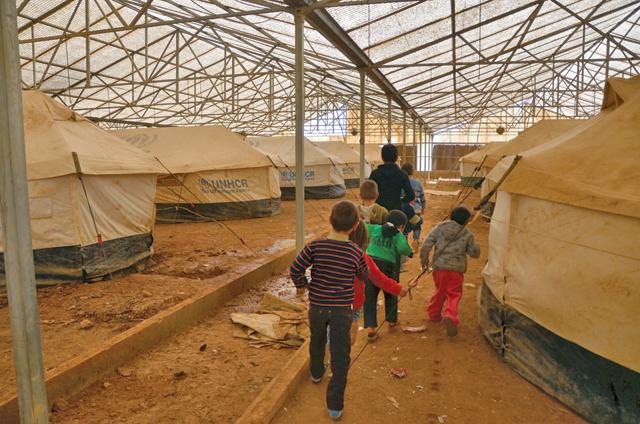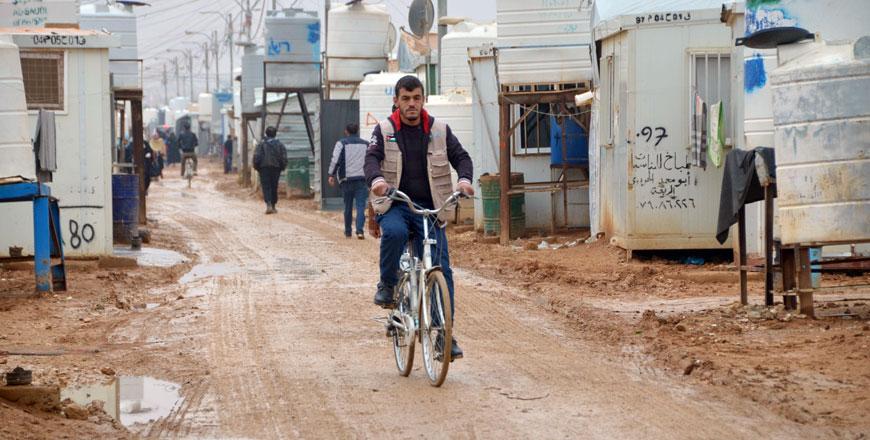DABAA — A lack of essential services has made it difficult for one Syrian tribe to stay at a makeshift camp that they have been calling home for the past few months.
Members of Al Aboud tribe from the Syrian city of Idlib set up camp on a farm located in the Dabaa area, an hour-and-a-half drive south of the capital, after they found the Zaatari Refugee Camp uncomfortable for their families.
Mahmoud Al Aboud said he only spent three hours in the Zaatari camp, and he could not stand staying there.
“My family did not feel comfortable there, so I decided to leave the camp. I even did not mind staying in the desert; I just wanted to make life as easy as possible for my family,” he told The Jordan Times at his tent.
He said his family were worried about having their female relatives living in an “exposed environment” where there is little privacy, among other safety concerns.
Mahmoud and another 110 Syrian refugees are currently staying at a facility that used to be a poultry farm at an olive orchard owned by a Saudi national.
The facility currently houses around 17 tents, where more than 50 per cent of the residents are children.
Mahmoud noted that he learned about the location of the farm from a friend of his.
“In the beginning, we stayed outside the farm. Gradually, I erected my tent in the orchard and a number of my relatives followed suit,” he recalled.
When the snowstorm hit the Kingdom last December, the tents flooded and the situation became very difficult.
“After that, the owner of the farm found out about us and decided to let us stay there,” Mahmoud added.
But living conditions have been less than ideal.
Alwan, father of three, said the place does not include bathrooms or kitchens.
“There is a small tent for women to cook, but it is not very suitable for cooking, to be honest,” he told The Jordan Times outside the kitchen.
Alwan said they need water because the farm’s water is only suitable for irrigation.
Omar, father of five, said his family and relatives do not have warm clothes for winter.
“We left all our belongings in Syria when we moved to Jordan. Winter here [on the farm] is really cold, and the children need heavy clothes,” he added.
But Al Aboud tribe members have few other choices, according to Mahmoud, who said that his fellow tribesmen cannot afford to rent apartments.
Instead of waiting for others to send them aid, the refugees are always on the lookout for jobs to secure a decent living.
“We don’t like to receive relief items from charities because we want to work and financially help our families,” Mahmoud added,
“We only work at this farm, and it is a seasonal job because this farm only has olive trees. Our job is done when the season is over,” he said, adding that they are paid JD7 a day.
Most refugees in the makeshift camp are registered with the UNHCR, according to Mahmoud.
“I go to Mafraq city in the north to get my food voucher, worth JD240, because we are registered there. I have to get a car or a bus to get there, which costs me JD75,” he added.
Kanaan, a fellow tribesman, said it is also difficult for refugees to receive health services because most places are far from the farm.
The nearest city is in the Zizia area, which is a one-hour drive from the farm, according to Mahmoud.
“If I want to get bread for my family I have to go there,” Kanaan added.
For children, life in the camp can be boring.
Abdul Munem said leisure time activities are limited.
“We only play either marbles or football. There is nothing else to do,” the 12-year-old added.
Seven-year-old Nadia said she misses going to school.
“My favourite subject is Arabic, and I would love to be back in school to take it,” she added.
Despite all its disadvantages, Al Aboud tribe members see the farm as a place they can call home, according to Mahmoud.
“We won’t leave this place; we feel safe here, but we pray every day that stability will be regained in Syria so that we can go back to our country.”
















